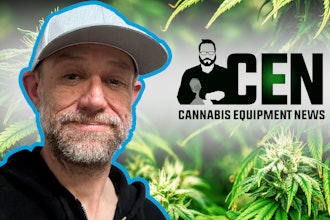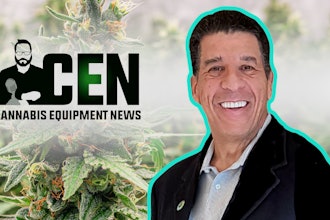Editor's Note: Download the audio version below and click here to subscribe to our newsletter.
This week, Jim Higdon discusses his evolution from journalist and author to co-founder and chief communications officer of Cornbread Hemp, a company dedicated to manufacturing USDA organic-certified, whole-flower CBD products.
Higdon grew up in Lebanon, Kentucky, a town notorious for the largest marijuana syndicate in American history. The federal government referred to it as the "cornbread mafia," and from 1985 and 1989 about 70 members of the community were arrested for producing a reported 200 tons of illegal cannabis. The event traumatized the community and had a large impact on Higdon.
Higdon pursued a college degree to become a writer. He wanted to tell his town's story: how it happened, why it happened, and why it all took place in rural Kentucky. Much of the area's involvement transpired from families with a history of bootlegging during Prohibition, and some people did significant jail time for cannabis crimes.
In his book, "The Cornbread Mafia: A Homegrown Syndicate's Code Of Silence And The Biggest Marijuana Bust In American History," Higdon discusses how the community never recovered from the first Prohibition. Before 1919, Lebanon had nine active distilleries in the county, all run and staffed by rural, Catholic men. When alcohol was made illegal, employees had to decide whether to let their kids go hungry or break the law to support their families. They decided that they could break man's law without violating God's law, but in the end they paid dearly for their crimes.
The book propelled Higdon into a journalism career in cannabis politics and policy. As he was covering the passage of the 2018 farm bill, he decided that it was time to "get out of the bleacher seats" and into the game. His coverage of the industry was influential during the passage of the farm bill, but he wanted to start making real, high-quality CBD products sourced from Kentucky hemp farmers.
Higdon co-founded Cornbread Hemp in 2018 as the first Kentucky-based CBD company to offer certified organic products.
The hemp industry is still primarily based on a whole plant formulation. Basically, processors cut the plant off at the root, throw it into a wood chipper, pelletize it and extract CBD oil from the pellets. Although the material includes hemp flower, it also contains fibers and cellulosic material from the stalks, as well as chlorophyll from the leaves. The resulting oil is low-quality, but consumers are none the wiser.
Higdon wanted to shake the industry up by providing a flower-only product. He stressed that if you're interested in CBD as a consumer, there is no point buying whole plant when you can buy flower only. He uses orange juice as a metaphor. Beverage companies wouldn't cut down and process an entire orange tree to make juice — they just use the fruit. Higdon says the whole-plant approach is a low standard that the industry is stuck with.
Low standards persist because of a lack of FDA regulation or clear industry definitions. Some CBD companies take advantage of gray areas in the industry, and no one is policing them. For example, some brands claim to offer an “organically grown” product even though its not USDA-certified organic.
Other shady business practices include the mistreatment of farmers. Higdon is angry that farmers take on significant risk growing hemp, and some have lost their shirts after companies refused payment or went under before settling up. He says farmers were promised a legal industry, but no one anticipated that the FDA would drag its feet and keep the industry on the sidelines with a legal but unregulated product.
Doing right by farmers is vital to Cornbread Hemp. Higdon notes that farmers have had a tough time over the years, and many are desperate former tobacco farmers who switched to hemp for a lifeline. When the FDA balked at regulation and major retailers refused to sell ingestible CBD products, the market was stunted and farmers were left holding the bag.
As Cornbread Hemp increases its market share, the company will continue to increase investment in Kentucky farms. The company doesn’t have plans to cultivate or vertically integrate, because good farming partners are key to the business. Kentucky is uniquely well-suited as a cannabis production region with a superior climate and geopositioning on the 37th parallel. According to Higdon, the light cycles are ideal and the area is rich with agricultural resources.
Cornbread Hemp was geared up to make a splash in 2020, but was forced to stop retail development and pivot to e-commerce with the onset of the COVID-19 pandemic. Still, the company remains on track to more than double its revenue in 2021 and is growing its market share everyday.
The company, founded in 2018, was relatively late to the hemp game, which began in Kentucky in 2014. When Higdon and company started looking for capital, the investor class in Kentucky had, for better or worse, already picked a hemp industry horse. The company turned to crowdfunding — specifically, the Wefunder platform. With an average investment of a little less than $500 from 899 investors, the company raised $392,871. The money was used for product development, payroll and marketing expenses to help get the company off the ground. Headquartered in Louisville, the company now has five full-time employees and plans for another fundraising round to ramp up production.
Higdon remains hopeful that FDA regulation will help lift the lid on the marketplace, and the consumer base will expand exponentially as CBD products reach customers in big box stores, pharmacies and other retail outlets. Until then, challenges remain after CBD retail sales took a big hit in 2020, and retailers remain shy about onboarding new CBD products.
As the company works to build relationships with small and mid-size retailers, counterfeit labeling remains a big problem in the CBD industry. In Cornbread’s young history, it has already been affected by counterfeits. The company launched its first product in April 2019, and by August the company found out that a U.K. operation was selling counterfeit CBD capsules with Cornbread's labeling. The only reason it came to their attention was because a father, who was buying the product for his son, reached out to the company to make sure the product was legitimate.
The company has since adopted rigorous new labeling practices, including a holographic seal for counterfeit product protection. The packaging also includes a QR code with a hidden four-digit pin to prove that it is a unique product. The QR code also links to lab reports so consumers can read up on the product’s cannabinoid potency and terpene profile, as well as on its safety checks against residual solvents, heavy metals, pesticides and biological contaminants. All reports are available on the Cornbread website before purchase.
Cornbread Hemp started as a small, family-owned business with $100,000 in seed capital, and they have, as Higdon testifies, worked like dogs to create a superior CBD product to market. And with every success has come a new hill to climb.
Please make sure to like, subscribe and share the podcast. You could also help us out a lot by giving the podcast a positive review on Apple podcast or whatever platform you use. Finally, to email the podcast or suggest a potential guest, you can reach David Mantey at David @cannabisequipmentnews.com with “Email the Podcast” in the subject line.






















